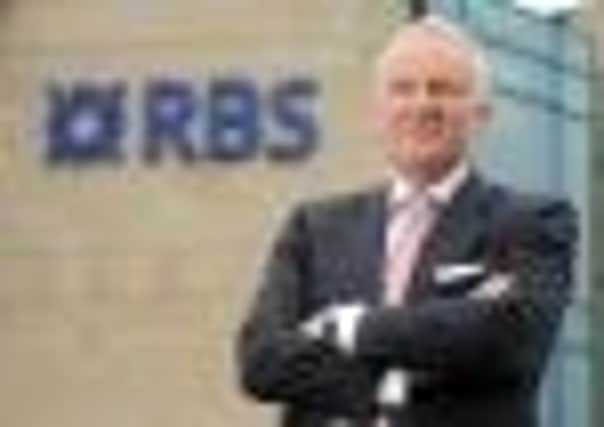Interview: Rory Cullinan, head of RBS’ non-core division


However, for Rory Cullinan, the man with the task of selling off Royal Bank of Scotland’s unwanted, “non-core” assets, the reward for his success will be bittersweet as he’ll be out of a job.
“The end result is my demise,” he says as he considers the progress he has made so far in unwinding the £258 billion mountain of complex instruments and trading positions that RBS identified in 2009 as being no longer required.
Advertisement
Hide AdAdvertisement
Hide AdAssets in the bank’s non-core division have since shrunk to £83bn by the end of the first quarter of this year.
Cullinan is aiming to get that figure down to between £65bn and £70bn by the end of the year, before being left with a “rump” of around £40bn by 2013.
The chunkiest deal so far has been the $7.3bn (£4.7bn) sale of RBS’s aircraft leasing business to Japanese bank Sumitomo Mitsui Financial Group, announced in January – although the cash only arrived at RBS on Friday.
Cullinan explains that the deals can take time to close partly because of the sheer scale and geographic reach of the assets being sold.
As an example, he points to the £3.9bn sale of project finance assets and associated derivatives to Bank of Tokyo-Mitsubishi UFJ.
The deal spanned 21 countries, 240 separate clients and involved 60,000 documents being stored in a data room, with about 2,000 questions asked during the process. So it is no surprise that the sale, which began in December 2010, is only now nearing completion. “There are plenty of hurdles to jump over,” he says with some understatement.
Two deals with two Japanese banks suggests something of a theme, and it is clear that Japanese banks are seeking growth opportunities overseas because they are not going to find them domestically.
“Fundamentally, it’s other banks who are buying this stuff,” Cullinan says. “It’s not European banks because they’re not really asset-hungry. The excess liquidity in the world is in Asia and America. Asia really means Japan. The Chinese aren’t really playing, but why would they? They’ve enough growth at home.”
Advertisement
Hide AdAdvertisement
Hide AdThis week sees him back in Tokyo, and he says his destinations say a lot about the global appetite for assets and risk: “When I get on a plane it’s quite telling, as I go to New York or Tokyo or Beijing. I don’t go to Paris or Milan or Frankfurt. I go fishing where the fish are.”
The current woes in the eurozone may not knock his disposal plans off course materially, but Cullinan concedes that these are worrying times.
“To the extent where we’re selling European assets with European risk, investors are still reluctant to take that risk, or they’ll sit and wait.
“Sentiment can change so quickly. Last August, you couldn’t find anyone to invest in Europe. Come January and February, it was very active. Now it’s shifted back, but we have to keep going. The key issue is to focus on what we can achieve, rather than exogenous factors outside our control.”
While he admits to getting personal satisfaction from winning the big deals, Cullinan believes the smaller ones often mean the most to him and his several hundred colleagues in the non-core division.
“Obviously you can get the glory of the big ones, but we’ve only had two or three of those. We closed a deal last Saturday morning for $490 million, which in some ways gives me more satisfaction.”
He adds: “Often with the little deals, the intrinsic value might be £5m and you sell it for £7m – those are very satisfying.”
Born in Castle Douglas, Cullinan left Scotland for Botswana in 1978, where he cut his business teeth working with Irish serial entrepreneur Roger Anderson, whom he descirbes as a “real dynamo”.
Advertisement
Hide AdAdvertisement
Hide Ad“We started with one store and went to 13 stores and two supermarkets in three years. That was a lot of fun. It was a very successful business, called Guys and Girls, with 130 employees.”
He says there are parallels to draw between selling clothes in Botswana and making multi-million-pound deals all over the world: “It’s all about getting good people and return on capital. I’ve never forgotten that lesson.”
After Botswana, he ended up at Citibank in New York and “never worked out how I got from the desert to the jungle so fast”.
In 1992, he co-founded Verdoso, a private investment fund that owned the Sellotape company, and remained a partner there until 2000.
Cullinan has also spent time in Russia and, having previously worked at RBS as head of equity finance between 2001 and 2005, returned to private equity before rejoining the bank in 2009.
He was persuaded back because heading the non-core division was “one of those jobs that’s once in a lifetime – you can’t turn it down”.
Once the job is done, and all the non-core assets have either been offloaded or run off, Cullinan says RBS will still be one of the biggest banks in the world.
“And it will still be a lot bigger than it was ten years ago. But it’s important not to be seduced by the word ‘big’.”
Advertisement
Hide AdAdvertisement
Hide AdHe continues: “Big banks have failed each decade over the last four or five decades that I can remember. If you’re very big, you can fail.”
However, failure is not an option for Cullinan, who laughs as he remembers the time someone asked him if this was the toughest job he has ever had.
“I had to say no, because I have three teenage daughters.”